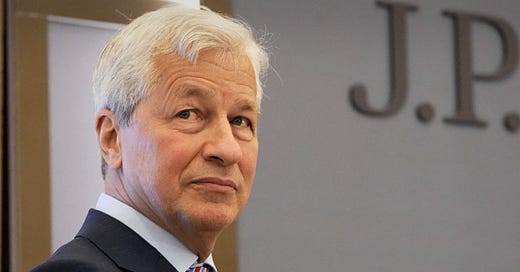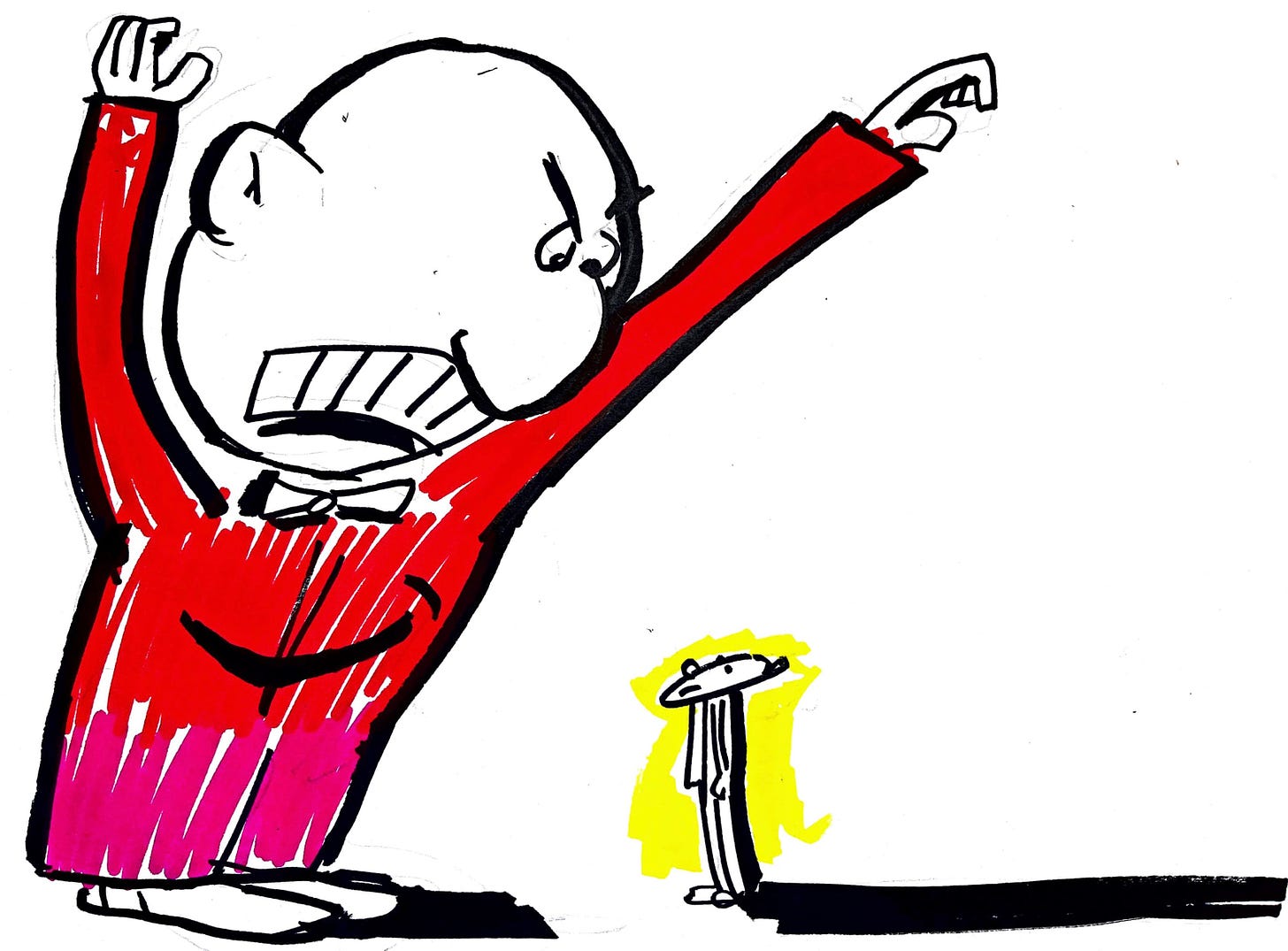When Jamie Dimon, CEO of JPMorgan Chase, phoned me
Dimon opposes stricter capital requirements designed to avoid another meltdown of Wall Street. His opposition may damn those requirements
Friends,
I planned to write you today about the pending government shutdown, but I’m going to hold off until the adults in the Senate have negotiated with Republican juvenile delinquents in the House.
So I want to talk about something else that’s brewing that could become an equally large problem: another banking crisis — and how powerful monied interests on Wall Street are opposing attempts to ward it off.
When interest rates rise as fast as the Fed has raised them, banks have to pay more for deposits or borrowing. But what the banks earn on their loans and bonds they own hasn’t risen nearly as fast. This is causing a huge squeeze.
With the shift to working from home, commercial real estate is a disaster — and another giant headache for the banks.
Banks may not have enough capital on hand to weather an economic storm. The near failure of several middle-sized banks last March shows the continued frailty of the financial system.
So government bank regulators — spearheaded by Michael Barr, the Fed’s vice chair for supervision — are proposing that banks set aside more capital to guard against the risk of bank failures.
Clearly, Barr and the Fed are correct in this. More of a capital cushion is necessary to avoid another financial crisis and taxpayer-funded bailout.
But the big banks are opposed. Setting aside more capital means less money for them to gamble with, hence lower profits. They’d like to continue to get the upside gains of their bets while being bailed out by you and me if they get into trouble.
The CEO of JPMorgan Chase, Jamie Dimon, is blasting the stricter capital proposal, warning it could prompt lenders to pull back and hamper economic growth.
Dimon’s opposition could well kill the proposal. Dimon has a great deal of power, although you may not have heard of him or followed exactly what he does (which is how power is exercised in America: quietly).
JPMorgan Chase is the largest bank in the United States. After the 2008 financial crisis, The New York Times gave Dimon the back-handed compliment of being “America’s least-hated banker.” Until recently, Dimon also headed the Business Roundtable, a lobbying group of the most powerful CEOs in America. He is featured regularly on cable news and in the business press. His opinions carry significant weight on Capitol Hill.
As we learned in 2008, JPMorgan Chase is too big to fail. We taxpayers will be forced to bail it out if it gets into trouble. Which is why Dimon and JPMorgan oppose the proposed capital requirements.
Every Republican lawmaker on the House Financial Services Committee has urged the Fed to withdraw its proposal. The Bank Policy Institute, a Wall Street lobbying group, has rolled out a national ad campaign urging Americans to “demand answers” on the new proposal. Other financial lobbying groups are threatening to sue.
And the Democrats? What worries me is that Dimon is one of Wall Street’s chief fundraisers for Democrats. Like Bob Rubin, another Wall Streeter, Dimon has a lot of clout in the Democratic Party.
IN THE SPRING OF 2018, Dimon phoned me at my office at Berkeley. I had criticized his bank publicly, and he was not pleased. He was outraged that I had been critical of the degree of concentration of big Wall Street banks, which still control a record amount of the nation’s assets.
He sounded off on the phone for several minutes without stopping. Finally he asked, “You still there?” I said, “Yes” and then told him in abbreviated form what I will tell you now.
I was correct to be critical. The five largest Wall Street banks, including JPMorgan, now control more than half of the banking industry’s $15 trillion in assets. This puts extraordinary financial and political power into the hands of a very few people, including Dimon.
In the 1950s and ’60s, when banking was boring, the financial sector accounted for just 10 to 15 percent of U.S. corporate profits. But deregulation made finance exciting and exceedingly profitable. The financial sector now claims more than 30 percent of corporate profits. That’s more than three times the profits made in all U.S. manufacturing.
A package of regulations put in place after the 2008 financial crisis (called Dodd-Frank) was not nearly as strict as the banking laws and regulations of the 1930s. It required only that the banks submit to stress tests by the Fed and hold a certain minimum amount of cash on their balance sheets to protect against shocks, but it didn’t prohibit banks from gambling with their investors’ money.
Why didn’t Dodd-Frank go further? Because Wall Street lobbyists, headed by Jamie Dimon and backed with generous campaign donations from the Street, didn’t want any more restrictions on the profits they could pocket. (I should add that Michael Barr helped design Dodd-Frank.)
If Dimon’s opposition to stricter capital controls for the nation’s banks makes it impossible for regulators to implement such controls — which seems likely — and the banking system becomes even more fragile, who is likely to lose their jobs, homes, and savings? Not the bankers. In the 2008 financial crisis, the people who suffered the most were poor and working-class Americans.
Dimon is emblematic of an abdication of public responsibility to maintain the health of our political-economic system at a time when a comparative few at the top have more power over it than at any time in more than a century.
They have used their power to give themselves unprecedented wealth, which has bought them even more power. They have justified their wealth and power as being in the interest of the public, but the public has been shafted — which is why anti-establishment populism is now the strongest political movement in America.
Democrats must stop listening to Jamie Dimon, Bob Rubin, and other denizens of the Street. Instead, they must stand up to Wall Street and the rest of the American oligarchy.
Otherwise, Trump and his Republican enablers will fill the populist void with fascism.
“Big business, elite media, and major donors are lining up behind the campaign of my opponent because they know she will keep our rigged system in place,” said Trump in his acceptance speech at the Republican convention in 2016.
The system is rigged. But Trump’s fascism will make it far worse.
Subscribers to this newsletter are keeping it going. If you are able, please consider a paid or gift subscription. And we always appreciate your sharing our content with others and leaving your thoughts in the comments.






American Banks and Auto Industry were to " Big to Fail" in 2008 why Wage Earners are to small to Count can not even be provided basic Healthcare coverage or living wage . EXEMPT all income tax on the first 40k of Wage earnings and provide Social Healthcare to ALL now ! TAKE CARE OF AMERICANS WHO PRODUCE GOODS AND SERVICES! We.Need a Safety Net for ALL Americans NOT for reckless CEOs who mismanage BIG business. ABUSED WAGE EARNERS SHOULD NOT PICKUP BIG COMPANIES BAILOUTS!
The average American has every right to be very angry with both political parties, because we have been constantly abused by the very corporations that financially support both parties.
Nonetheless, the republican party is, by far, the absolute worst of our two party system and if returned to power in 2024, a fascist government is all but assured.
I never thought I would write this, but I genuinely admire Biden's progressivism in some matters; moreover, Biden is a far more progressive president than Clinton and Obama.
Yet, both political parties have allowed U.S. corporations far too much power, and your newsletter today highlights the fact that fascism is actually thriving in the political machinations of corporate America.